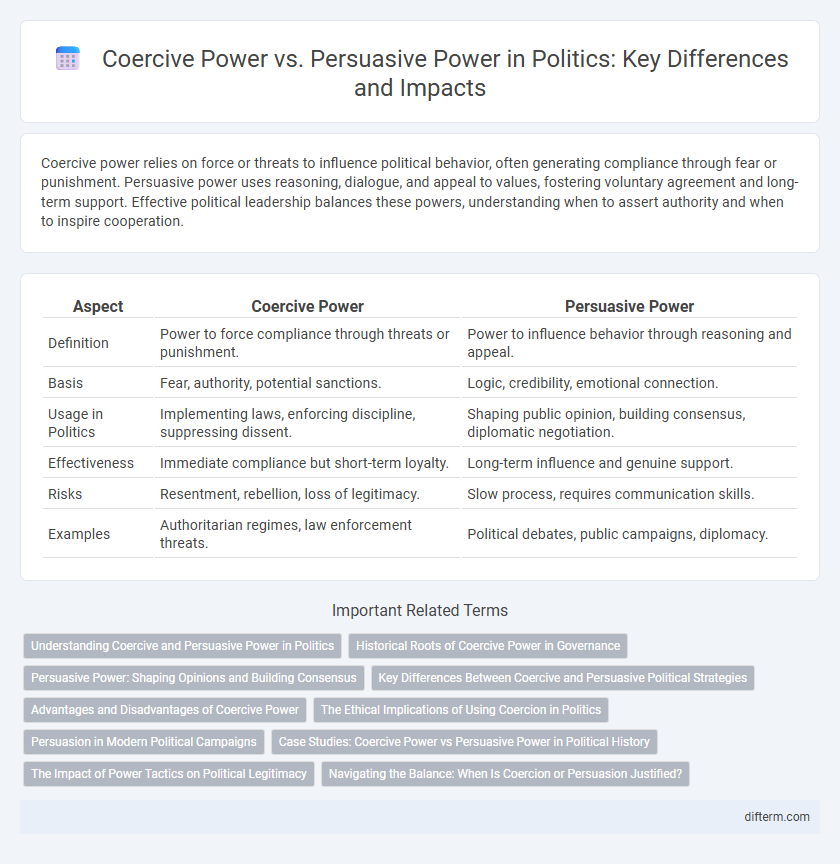Coercive power relies on force or threats to influence political behavior, often generating compliance through fear or punishment. Persuasive power uses reasoning, dialogue, and appeal to values, fostering voluntary agreement and long-term support. Effective political leadership balances these powers, understanding when to assert authority and when to inspire cooperation.
Table of Comparison
| Aspect | Coercive Power | Persuasive Power |
|---|---|---|
| Definition | Power to force compliance through threats or punishment. | Power to influence behavior through reasoning and appeal. |
| Basis | Fear, authority, potential sanctions. | Logic, credibility, emotional connection. |
| Usage in Politics | Implementing laws, enforcing discipline, suppressing dissent. | Shaping public opinion, building consensus, diplomatic negotiation. |
| Effectiveness | Immediate compliance but short-term loyalty. | Long-term influence and genuine support. |
| Risks | Resentment, rebellion, loss of legitimacy. | Slow process, requires communication skills. |
| Examples | Authoritarian regimes, law enforcement threats. | Political debates, public campaigns, diplomacy. |
Understanding Coercive and Persuasive Power in Politics
Coercive power in politics relies on force, threats, or punishment to influence behavior, often leading to compliance out of fear rather than genuine agreement. Persuasive power, by contrast, depends on convincing arguments, communication skills, and credible leadership to shape beliefs and voluntary cooperation. Understanding the dynamics between these powers reveals how political actors negotiate control, legitimacy, and public support in various governance systems.
Historical Roots of Coercive Power in Governance
Coercive power in governance historically originates from the state's monopoly on the legitimate use of physical force, as theorized by Max Weber, where rulers enforce obedience through threats, punishment, and military control. Ancient empires and feudal systems relied heavily on coercive mechanisms like armies, police, and judicial punishments to maintain order and suppress dissent. This foundation contrasts with persuasive power, which builds legitimacy through ideology, communication, and consent rather than force.
Persuasive Power: Shaping Opinions and Building Consensus
Persuasive power in politics centers on shaping public opinion and building consensus through effective communication, empathy, and credibility rather than force or threats. It leverages rhetoric, dialogue, and emotional intelligence to influence beliefs and foster cooperation among diverse stakeholders. This form of power enhances democratic processes by encouraging voluntary support and sustaining long-term political alliances.
Key Differences Between Coercive and Persuasive Political Strategies
Coercive power relies on force, threats, or sanctions to influence political behavior, emphasizing compliance through fear and punishment, while persuasive power uses communication, reasoning, and appeals to values to achieve voluntary agreement and support. Coercion generates immediate obedience but often breeds resentment and resistance, whereas persuasion fosters long-term commitment and legitimacy by aligning interests and building trust. The fundamental difference lies in coercive power's reliance on authority and compulsion versus persuasive power's foundation in dialogue and consensus-building.
Advantages and Disadvantages of Coercive Power
Coercive power enables political leaders to enforce compliance through threats and punishment, ensuring immediate obedience and control in high-stakes situations. However, its disadvantages include fostering resentment, reducing trust among constituents, and potentially inciting resistance or rebellion. Reliance on coercive power often undermines long-term political stability and democratic legitimacy.
The Ethical Implications of Using Coercion in Politics
Coercive power in politics often raises significant ethical concerns due to its potential to undermine individual autonomy and democratic principles. The use of force or threats to achieve political goals can lead to abuses of power and erosion of trust between governing bodies and citizens. Persuasive power is generally viewed as more ethically sound because it relies on reasoned arguments and voluntary compliance, fostering a healthier political environment.
Persuasion in Modern Political Campaigns
Persuasion in modern political campaigns relies heavily on targeted messaging and data analytics to influence voter behavior and shape public opinion. Campaigns utilize social media platforms, emotional appeals, and credible endorsements to build trust and motivate electoral participation without coercion. This approach fosters democratic engagement by emphasizing dialogue, transparency, and the power of narrative over force or intimidation.
Case Studies: Coercive Power vs Persuasive Power in Political History
Coercive power in political history is exemplified by the authoritarian regimes of Stalin's Soviet Union, where repression and fear ensured compliance, contrasting sharply with Martin Luther King Jr.'s persuasive power that catalyzed the American civil rights movement through nonviolent advocacy. The fall of the Berlin Wall in 1989 demonstrated the limits of coercive power as East Germany's regime failed, while persuasive power manifested in widespread public protests influenced political change. These case studies underscore how persuasive power often yields sustainable political transformations, whereas coercive power may provoke resistance and eventual collapse.
The Impact of Power Tactics on Political Legitimacy
Coercive power in politics often undermines legitimacy by generating fear and resistance among the populace, while persuasive power fosters voluntary compliance and strengthens democratic institutions. Political leaders who rely on persuasion enhance their credibility and public trust, leading to more stable governance. Empirical studies reveal that regimes emphasizing persuasive tactics experience higher citizen engagement and long-term legitimacy compared to those dependent on coercion.
Navigating the Balance: When Is Coercion or Persuasion Justified?
Coercive power in politics often relies on force or threats to influence behavior, justified in scenarios demanding immediate compliance for national security or law enforcement. Persuasive power, based on dialogue and consensus-building, is essential in democratic processes where legitimacy and public support are paramount. Navigating the balance requires assessing the ethical implications and long-term consequences to maintain political stability and uphold civil rights.
coercive power vs persuasive power Infographic

 difterm.com
difterm.com